Blood, Sweat & T-shirts - A Review
VerifiedAdded on 2023/06/12
|13
|3739
|273
AI Summary
This report discusses the ethical obligations of retailers and professionals involved in the manufacturing and transportation of garments, with a focus on the documentary series Blood, Sweat & T-shirts. It also explores the application of Kantian theory and provides recommendations for dealing with ethical issues in the garment industry.
Contribute Materials
Your contribution can guide someone’s learning journey. Share your
documents today.
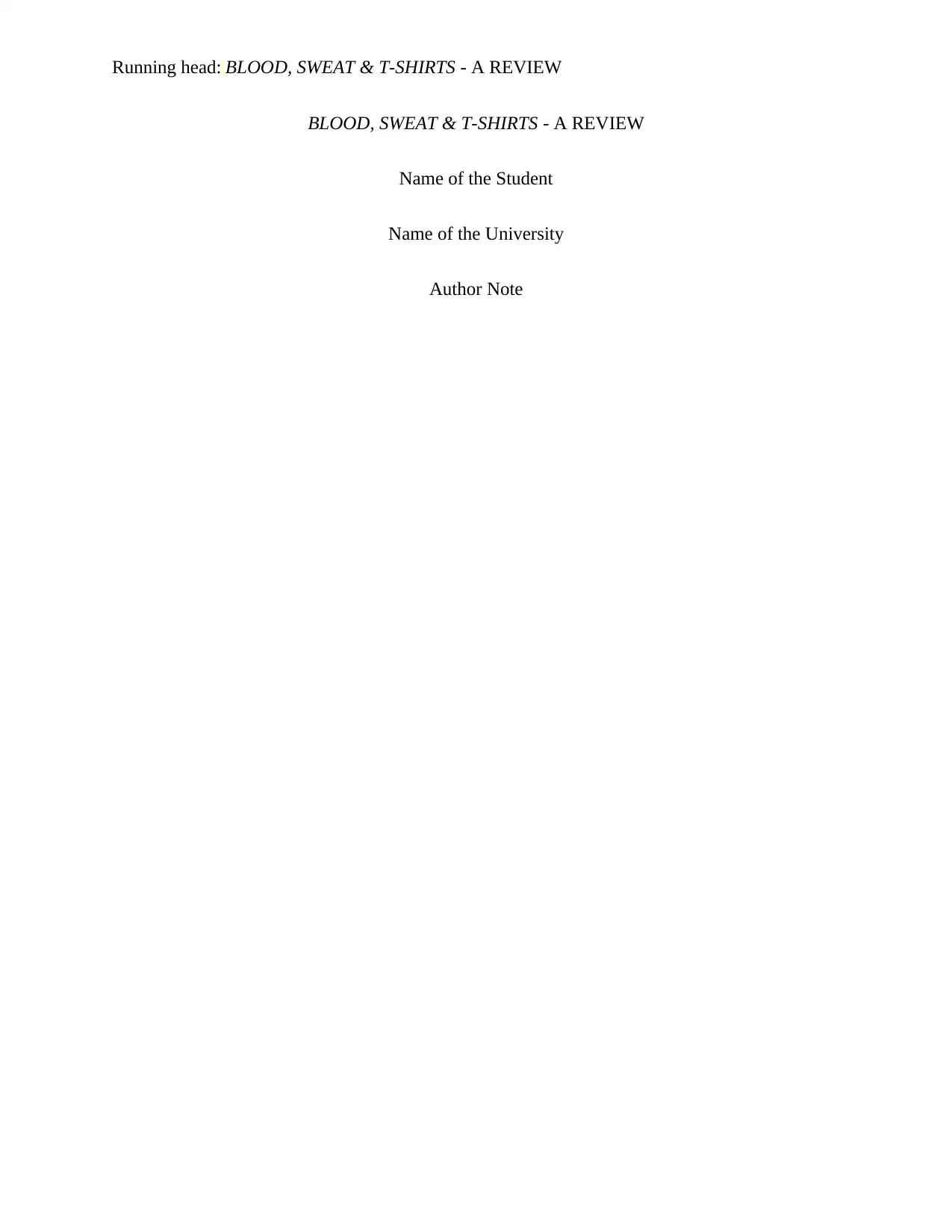
Running head: BLOOD, SWEAT & T-SHIRTS - A REVIEW
BLOOD, SWEAT & T-SHIRTS - A REVIEW
Name of the Student
Name of the University
Author Note
BLOOD, SWEAT & T-SHIRTS - A REVIEW
Name of the Student
Name of the University
Author Note
Secure Best Marks with AI Grader
Need help grading? Try our AI Grader for instant feedback on your assignments.
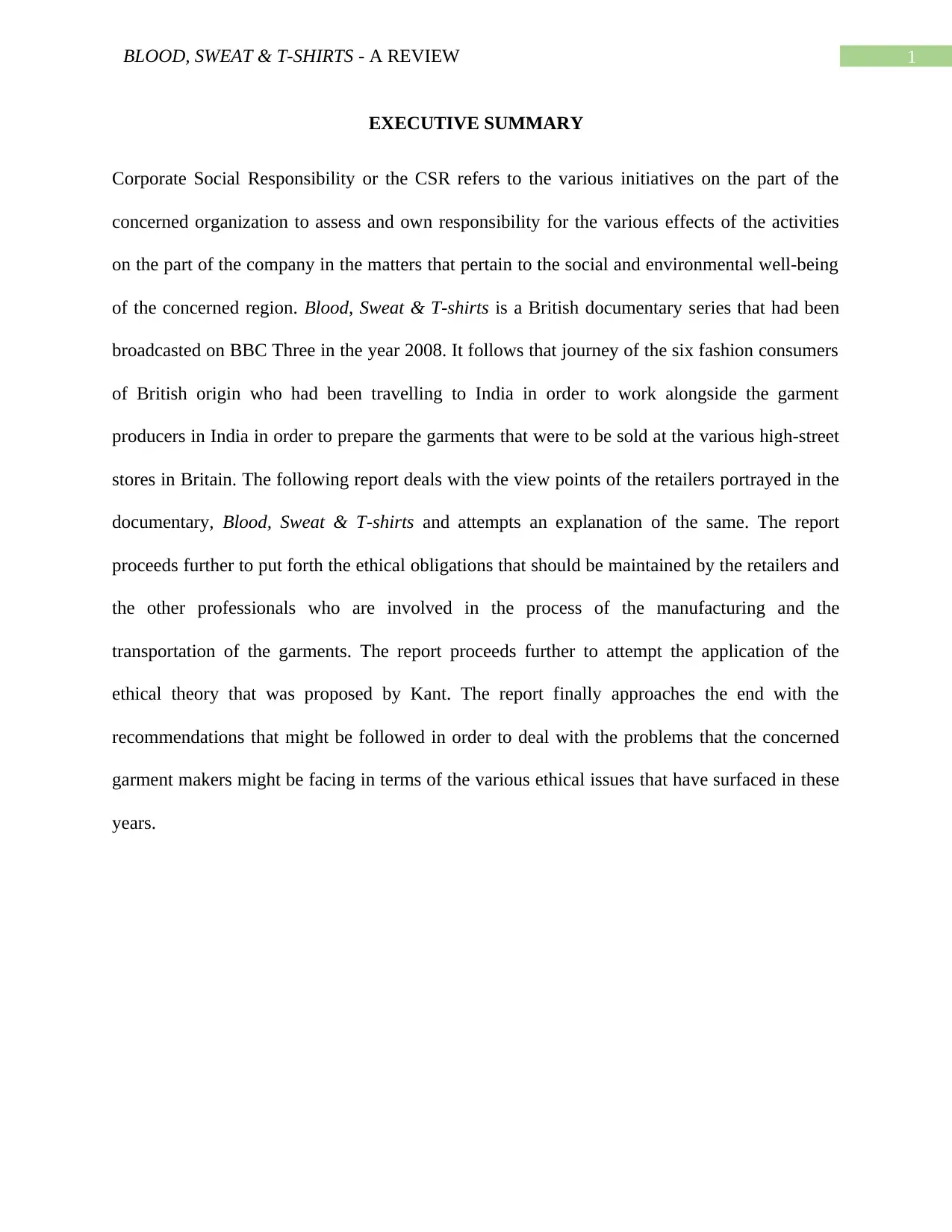
1BLOOD, SWEAT & T-SHIRTS - A REVIEW
EXECUTIVE SUMMARY
Corporate Social Responsibility or the CSR refers to the various initiatives on the part of the
concerned organization to assess and own responsibility for the various effects of the activities
on the part of the company in the matters that pertain to the social and environmental well-being
of the concerned region. Blood, Sweat & T-shirts is a British documentary series that had been
broadcasted on BBC Three in the year 2008. It follows that journey of the six fashion consumers
of British origin who had been travelling to India in order to work alongside the garment
producers in India in order to prepare the garments that were to be sold at the various high-street
stores in Britain. The following report deals with the view points of the retailers portrayed in the
documentary, Blood, Sweat & T-shirts and attempts an explanation of the same. The report
proceeds further to put forth the ethical obligations that should be maintained by the retailers and
the other professionals who are involved in the process of the manufacturing and the
transportation of the garments. The report proceeds further to attempt the application of the
ethical theory that was proposed by Kant. The report finally approaches the end with the
recommendations that might be followed in order to deal with the problems that the concerned
garment makers might be facing in terms of the various ethical issues that have surfaced in these
years.
EXECUTIVE SUMMARY
Corporate Social Responsibility or the CSR refers to the various initiatives on the part of the
concerned organization to assess and own responsibility for the various effects of the activities
on the part of the company in the matters that pertain to the social and environmental well-being
of the concerned region. Blood, Sweat & T-shirts is a British documentary series that had been
broadcasted on BBC Three in the year 2008. It follows that journey of the six fashion consumers
of British origin who had been travelling to India in order to work alongside the garment
producers in India in order to prepare the garments that were to be sold at the various high-street
stores in Britain. The following report deals with the view points of the retailers portrayed in the
documentary, Blood, Sweat & T-shirts and attempts an explanation of the same. The report
proceeds further to put forth the ethical obligations that should be maintained by the retailers and
the other professionals who are involved in the process of the manufacturing and the
transportation of the garments. The report proceeds further to attempt the application of the
ethical theory that was proposed by Kant. The report finally approaches the end with the
recommendations that might be followed in order to deal with the problems that the concerned
garment makers might be facing in terms of the various ethical issues that have surfaced in these
years.
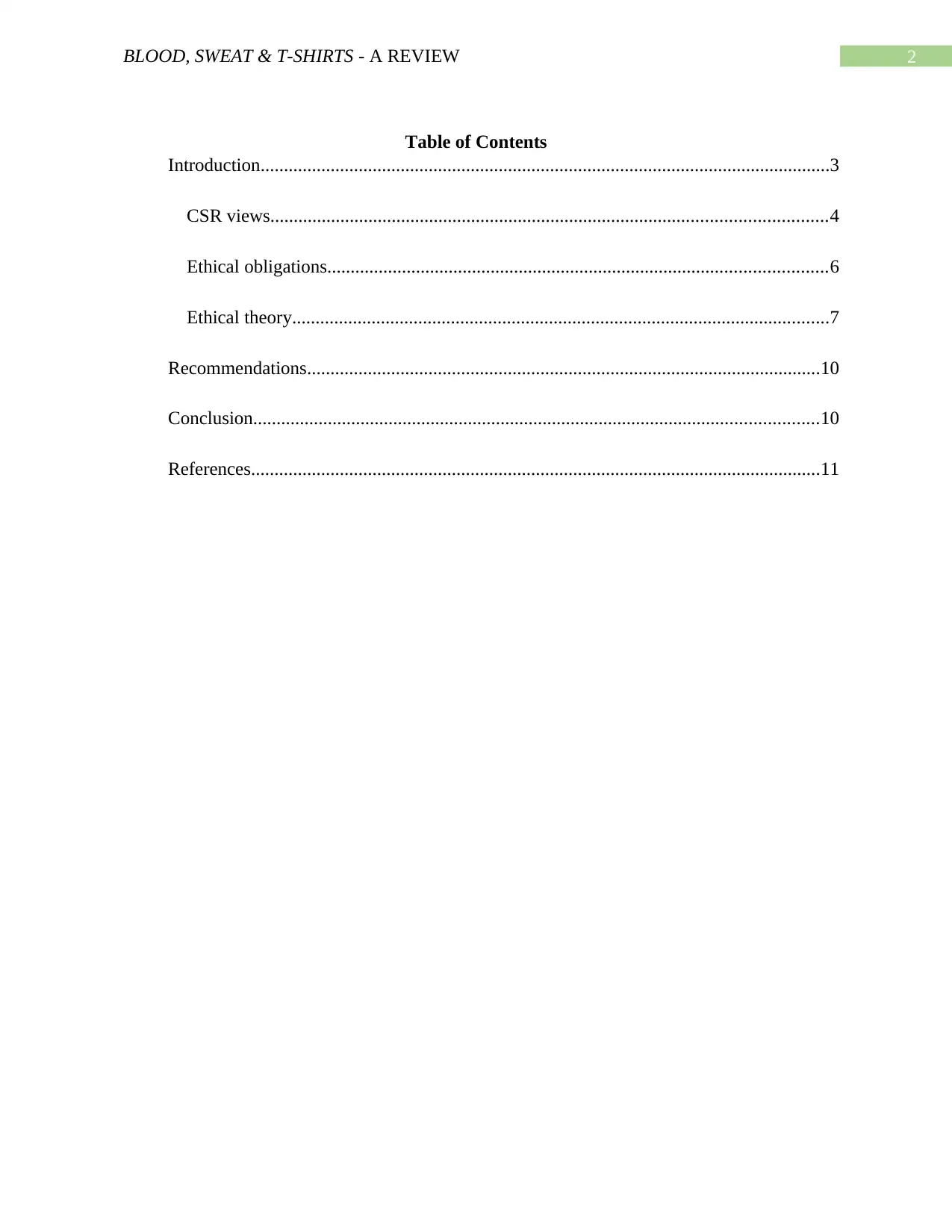
2BLOOD, SWEAT & T-SHIRTS - A REVIEW
Table of Contents
Introduction..........................................................................................................................3
CSR views.......................................................................................................................4
Ethical obligations...........................................................................................................6
Ethical theory...................................................................................................................7
Recommendations..............................................................................................................10
Conclusion.........................................................................................................................10
References..........................................................................................................................11
Table of Contents
Introduction..........................................................................................................................3
CSR views.......................................................................................................................4
Ethical obligations...........................................................................................................6
Ethical theory...................................................................................................................7
Recommendations..............................................................................................................10
Conclusion.........................................................................................................................10
References..........................................................................................................................11
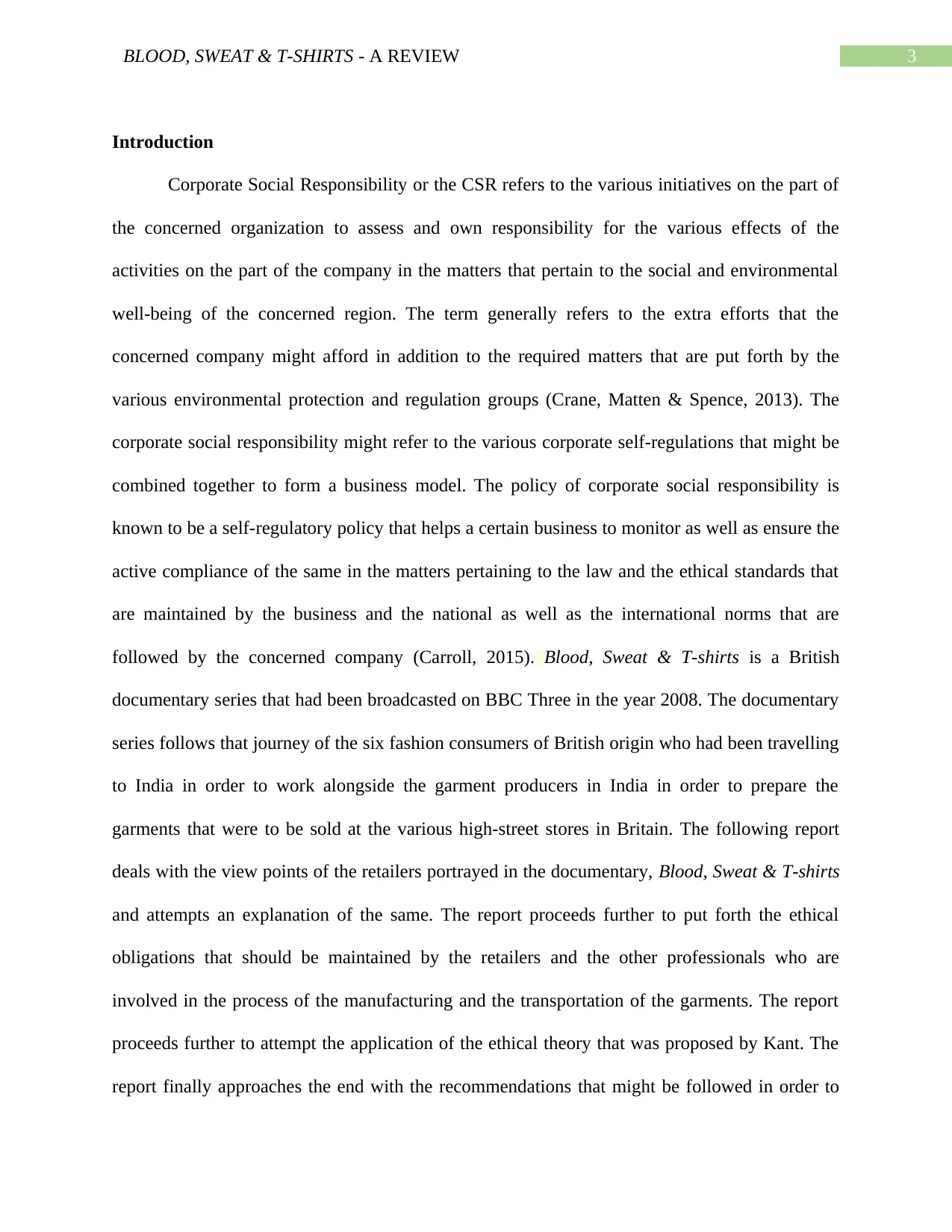
3BLOOD, SWEAT & T-SHIRTS - A REVIEW
Introduction
Corporate Social Responsibility or the CSR refers to the various initiatives on the part of
the concerned organization to assess and own responsibility for the various effects of the
activities on the part of the company in the matters that pertain to the social and environmental
well-being of the concerned region. The term generally refers to the extra efforts that the
concerned company might afford in addition to the required matters that are put forth by the
various environmental protection and regulation groups (Crane, Matten & Spence, 2013). The
corporate social responsibility might refer to the various corporate self-regulations that might be
combined together to form a business model. The policy of corporate social responsibility is
known to be a self-regulatory policy that helps a certain business to monitor as well as ensure the
active compliance of the same in the matters pertaining to the law and the ethical standards that
are maintained by the business and the national as well as the international norms that are
followed by the concerned company (Carroll, 2015). Blood, Sweat & T-shirts is a British
documentary series that had been broadcasted on BBC Three in the year 2008. The documentary
series follows that journey of the six fashion consumers of British origin who had been travelling
to India in order to work alongside the garment producers in India in order to prepare the
garments that were to be sold at the various high-street stores in Britain. The following report
deals with the view points of the retailers portrayed in the documentary, Blood, Sweat & T-shirts
and attempts an explanation of the same. The report proceeds further to put forth the ethical
obligations that should be maintained by the retailers and the other professionals who are
involved in the process of the manufacturing and the transportation of the garments. The report
proceeds further to attempt the application of the ethical theory that was proposed by Kant. The
report finally approaches the end with the recommendations that might be followed in order to
Introduction
Corporate Social Responsibility or the CSR refers to the various initiatives on the part of
the concerned organization to assess and own responsibility for the various effects of the
activities on the part of the company in the matters that pertain to the social and environmental
well-being of the concerned region. The term generally refers to the extra efforts that the
concerned company might afford in addition to the required matters that are put forth by the
various environmental protection and regulation groups (Crane, Matten & Spence, 2013). The
corporate social responsibility might refer to the various corporate self-regulations that might be
combined together to form a business model. The policy of corporate social responsibility is
known to be a self-regulatory policy that helps a certain business to monitor as well as ensure the
active compliance of the same in the matters pertaining to the law and the ethical standards that
are maintained by the business and the national as well as the international norms that are
followed by the concerned company (Carroll, 2015). Blood, Sweat & T-shirts is a British
documentary series that had been broadcasted on BBC Three in the year 2008. The documentary
series follows that journey of the six fashion consumers of British origin who had been travelling
to India in order to work alongside the garment producers in India in order to prepare the
garments that were to be sold at the various high-street stores in Britain. The following report
deals with the view points of the retailers portrayed in the documentary, Blood, Sweat & T-shirts
and attempts an explanation of the same. The report proceeds further to put forth the ethical
obligations that should be maintained by the retailers and the other professionals who are
involved in the process of the manufacturing and the transportation of the garments. The report
proceeds further to attempt the application of the ethical theory that was proposed by Kant. The
report finally approaches the end with the recommendations that might be followed in order to
Secure Best Marks with AI Grader
Need help grading? Try our AI Grader for instant feedback on your assignments.
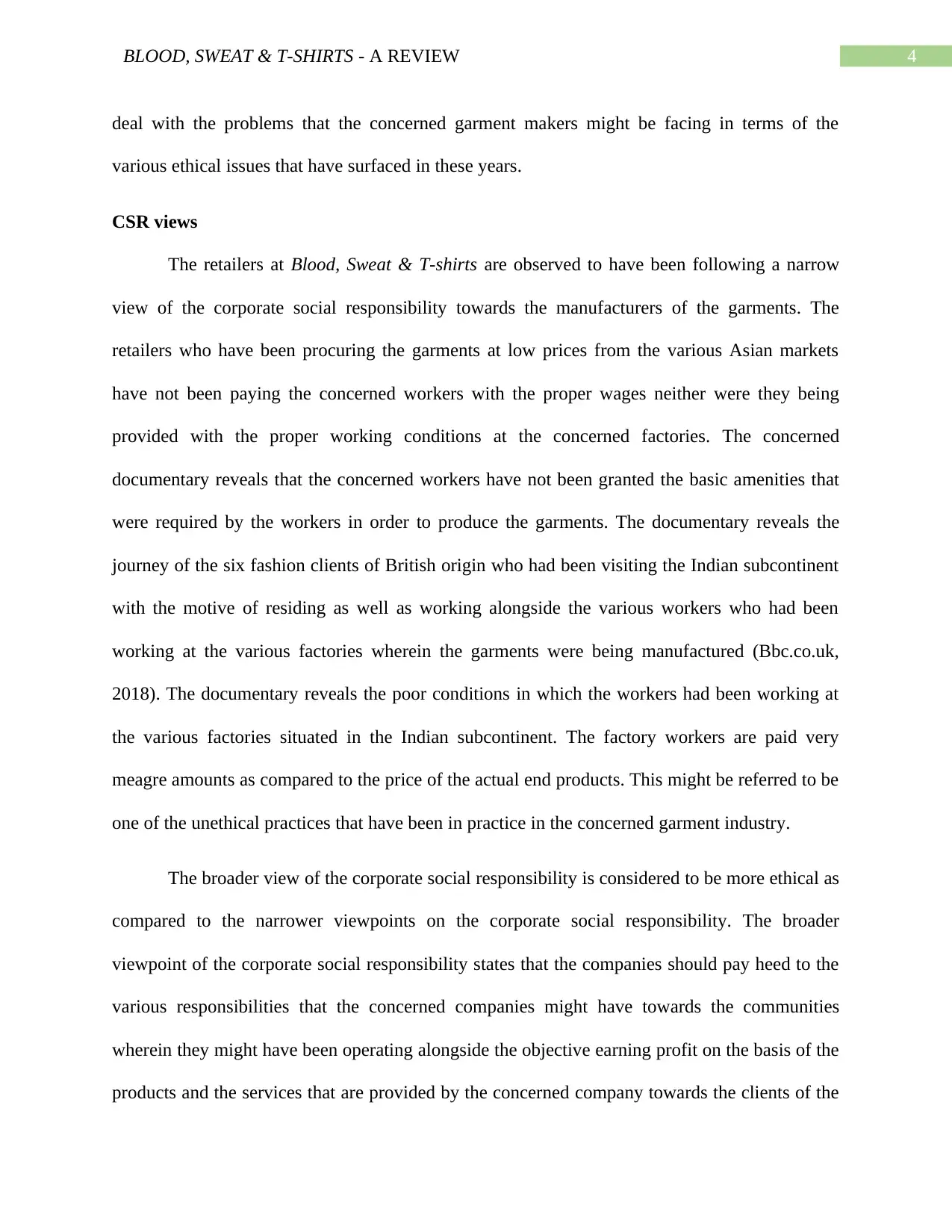
4BLOOD, SWEAT & T-SHIRTS - A REVIEW
deal with the problems that the concerned garment makers might be facing in terms of the
various ethical issues that have surfaced in these years.
CSR views
The retailers at Blood, Sweat & T-shirts are observed to have been following a narrow
view of the corporate social responsibility towards the manufacturers of the garments. The
retailers who have been procuring the garments at low prices from the various Asian markets
have not been paying the concerned workers with the proper wages neither were they being
provided with the proper working conditions at the concerned factories. The concerned
documentary reveals that the concerned workers have not been granted the basic amenities that
were required by the workers in order to produce the garments. The documentary reveals the
journey of the six fashion clients of British origin who had been visiting the Indian subcontinent
with the motive of residing as well as working alongside the various workers who had been
working at the various factories wherein the garments were being manufactured (Bbc.co.uk,
2018). The documentary reveals the poor conditions in which the workers had been working at
the various factories situated in the Indian subcontinent. The factory workers are paid very
meagre amounts as compared to the price of the actual end products. This might be referred to be
one of the unethical practices that have been in practice in the concerned garment industry.
The broader view of the corporate social responsibility is considered to be more ethical as
compared to the narrower viewpoints on the corporate social responsibility. The broader
viewpoint of the corporate social responsibility states that the companies should pay heed to the
various responsibilities that the concerned companies might have towards the communities
wherein they might have been operating alongside the objective earning profit on the basis of the
products and the services that are provided by the concerned company towards the clients of the
deal with the problems that the concerned garment makers might be facing in terms of the
various ethical issues that have surfaced in these years.
CSR views
The retailers at Blood, Sweat & T-shirts are observed to have been following a narrow
view of the corporate social responsibility towards the manufacturers of the garments. The
retailers who have been procuring the garments at low prices from the various Asian markets
have not been paying the concerned workers with the proper wages neither were they being
provided with the proper working conditions at the concerned factories. The concerned
documentary reveals that the concerned workers have not been granted the basic amenities that
were required by the workers in order to produce the garments. The documentary reveals the
journey of the six fashion clients of British origin who had been visiting the Indian subcontinent
with the motive of residing as well as working alongside the various workers who had been
working at the various factories wherein the garments were being manufactured (Bbc.co.uk,
2018). The documentary reveals the poor conditions in which the workers had been working at
the various factories situated in the Indian subcontinent. The factory workers are paid very
meagre amounts as compared to the price of the actual end products. This might be referred to be
one of the unethical practices that have been in practice in the concerned garment industry.
The broader view of the corporate social responsibility is considered to be more ethical as
compared to the narrower viewpoints on the corporate social responsibility. The broader
viewpoint of the corporate social responsibility states that the companies should pay heed to the
various responsibilities that the concerned companies might have towards the communities
wherein they might have been operating alongside the objective earning profit on the basis of the
products and the services that are provided by the concerned company towards the clients of the
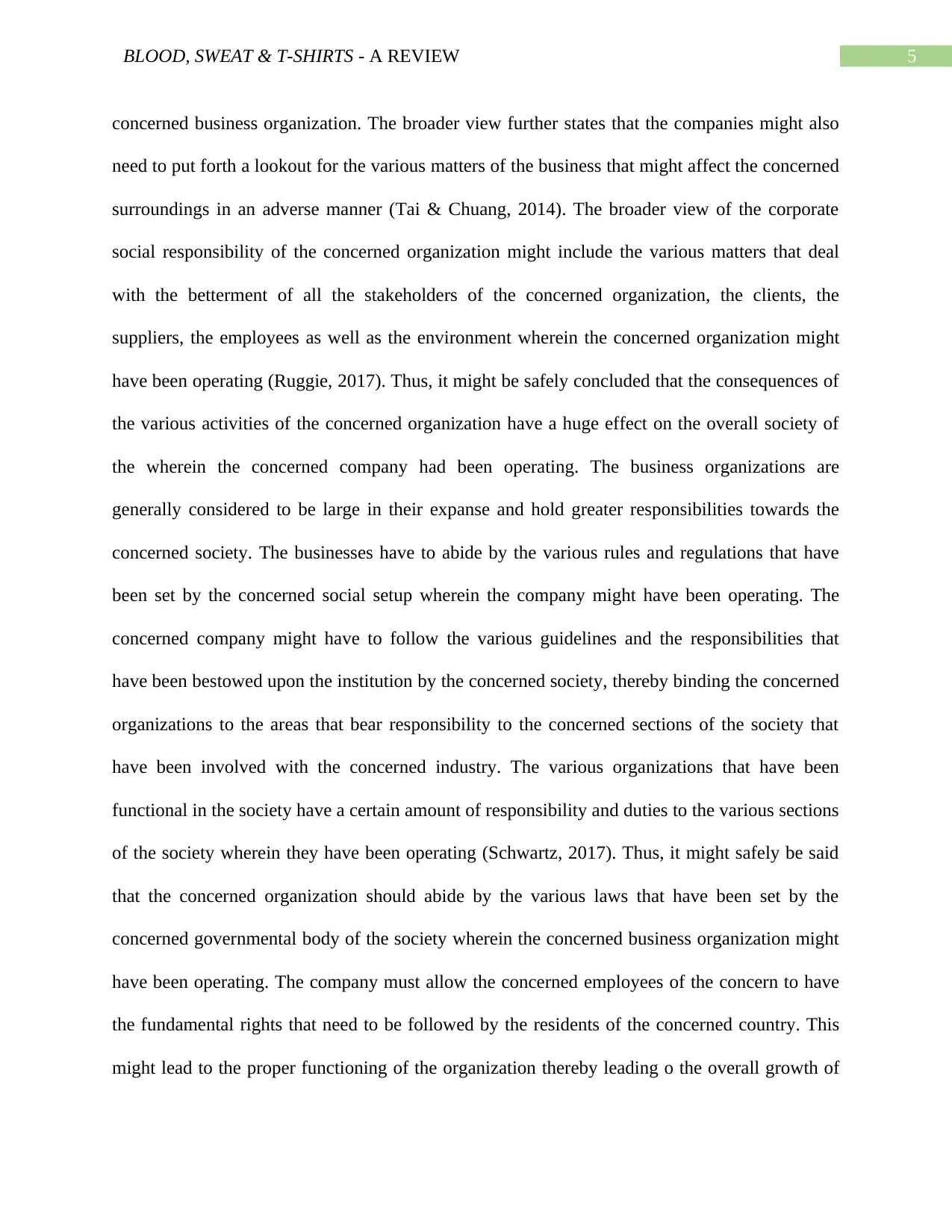
5BLOOD, SWEAT & T-SHIRTS - A REVIEW
concerned business organization. The broader view further states that the companies might also
need to put forth a lookout for the various matters of the business that might affect the concerned
surroundings in an adverse manner (Tai & Chuang, 2014). The broader view of the corporate
social responsibility of the concerned organization might include the various matters that deal
with the betterment of all the stakeholders of the concerned organization, the clients, the
suppliers, the employees as well as the environment wherein the concerned organization might
have been operating (Ruggie, 2017). Thus, it might be safely concluded that the consequences of
the various activities of the concerned organization have a huge effect on the overall society of
the wherein the concerned company had been operating. The business organizations are
generally considered to be large in their expanse and hold greater responsibilities towards the
concerned society. The businesses have to abide by the various rules and regulations that have
been set by the concerned social setup wherein the company might have been operating. The
concerned company might have to follow the various guidelines and the responsibilities that
have been bestowed upon the institution by the concerned society, thereby binding the concerned
organizations to the areas that bear responsibility to the concerned sections of the society that
have been involved with the concerned industry. The various organizations that have been
functional in the society have a certain amount of responsibility and duties to the various sections
of the society wherein they have been operating (Schwartz, 2017). Thus, it might safely be said
that the concerned organization should abide by the various laws that have been set by the
concerned governmental body of the society wherein the concerned business organization might
have been operating. The company must allow the concerned employees of the concern to have
the fundamental rights that need to be followed by the residents of the concerned country. This
might lead to the proper functioning of the organization thereby leading o the overall growth of
concerned business organization. The broader view further states that the companies might also
need to put forth a lookout for the various matters of the business that might affect the concerned
surroundings in an adverse manner (Tai & Chuang, 2014). The broader view of the corporate
social responsibility of the concerned organization might include the various matters that deal
with the betterment of all the stakeholders of the concerned organization, the clients, the
suppliers, the employees as well as the environment wherein the concerned organization might
have been operating (Ruggie, 2017). Thus, it might be safely concluded that the consequences of
the various activities of the concerned organization have a huge effect on the overall society of
the wherein the concerned company had been operating. The business organizations are
generally considered to be large in their expanse and hold greater responsibilities towards the
concerned society. The businesses have to abide by the various rules and regulations that have
been set by the concerned social setup wherein the company might have been operating. The
concerned company might have to follow the various guidelines and the responsibilities that
have been bestowed upon the institution by the concerned society, thereby binding the concerned
organizations to the areas that bear responsibility to the concerned sections of the society that
have been involved with the concerned industry. The various organizations that have been
functional in the society have a certain amount of responsibility and duties to the various sections
of the society wherein they have been operating (Schwartz, 2017). Thus, it might safely be said
that the concerned organization should abide by the various laws that have been set by the
concerned governmental body of the society wherein the concerned business organization might
have been operating. The company must allow the concerned employees of the concern to have
the fundamental rights that need to be followed by the residents of the concerned country. This
might lead to the proper functioning of the organization thereby leading o the overall growth of
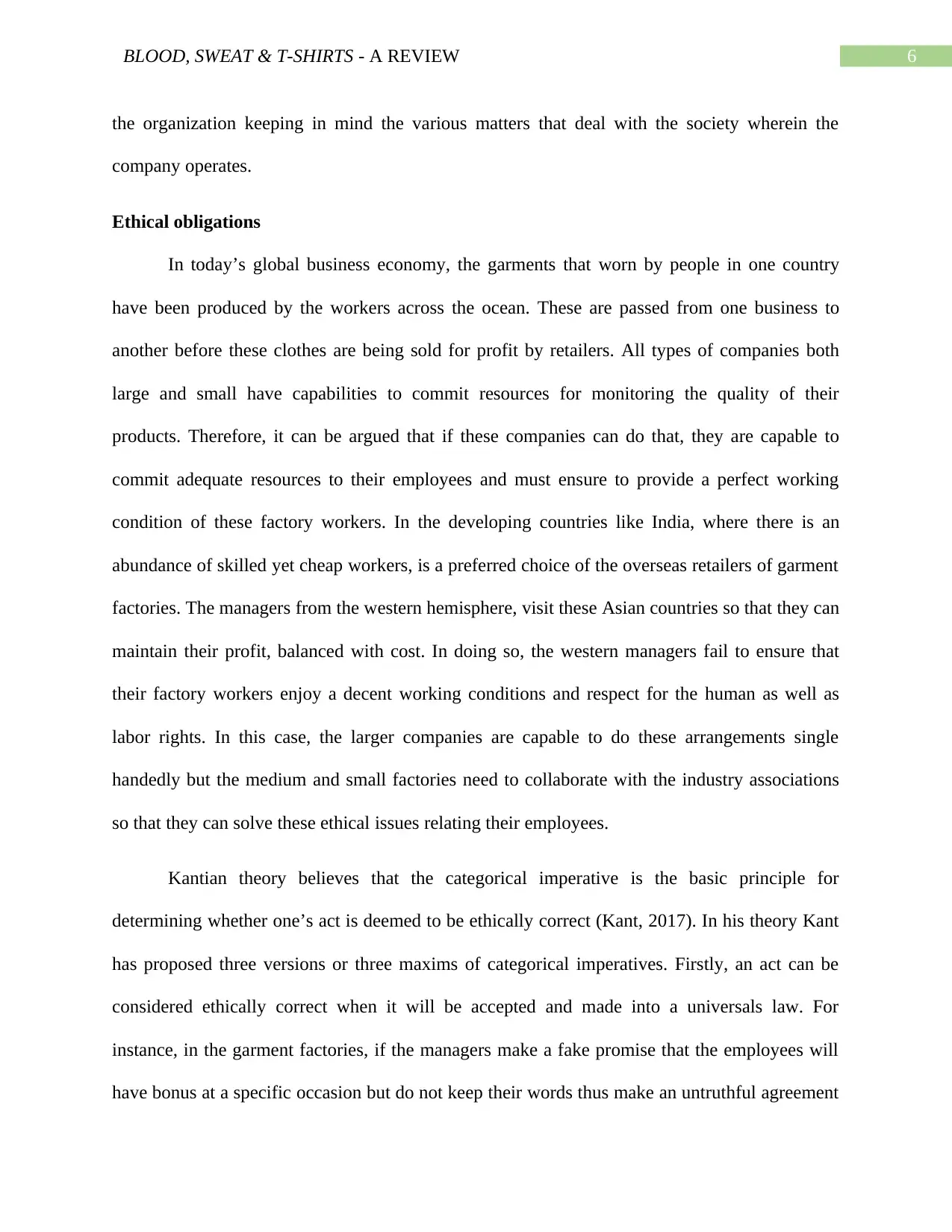
6BLOOD, SWEAT & T-SHIRTS - A REVIEW
the organization keeping in mind the various matters that deal with the society wherein the
company operates.
Ethical obligations
In today’s global business economy, the garments that worn by people in one country
have been produced by the workers across the ocean. These are passed from one business to
another before these clothes are being sold for profit by retailers. All types of companies both
large and small have capabilities to commit resources for monitoring the quality of their
products. Therefore, it can be argued that if these companies can do that, they are capable to
commit adequate resources to their employees and must ensure to provide a perfect working
condition of these factory workers. In the developing countries like India, where there is an
abundance of skilled yet cheap workers, is a preferred choice of the overseas retailers of garment
factories. The managers from the western hemisphere, visit these Asian countries so that they can
maintain their profit, balanced with cost. In doing so, the western managers fail to ensure that
their factory workers enjoy a decent working conditions and respect for the human as well as
labor rights. In this case, the larger companies are capable to do these arrangements single
handedly but the medium and small factories need to collaborate with the industry associations
so that they can solve these ethical issues relating their employees.
Kantian theory believes that the categorical imperative is the basic principle for
determining whether one’s act is deemed to be ethically correct (Kant, 2017). In his theory Kant
has proposed three versions or three maxims of categorical imperatives. Firstly, an act can be
considered ethically correct when it will be accepted and made into a universals law. For
instance, in the garment factories, if the managers make a fake promise that the employees will
have bonus at a specific occasion but do not keep their words thus make an untruthful agreement
the organization keeping in mind the various matters that deal with the society wherein the
company operates.
Ethical obligations
In today’s global business economy, the garments that worn by people in one country
have been produced by the workers across the ocean. These are passed from one business to
another before these clothes are being sold for profit by retailers. All types of companies both
large and small have capabilities to commit resources for monitoring the quality of their
products. Therefore, it can be argued that if these companies can do that, they are capable to
commit adequate resources to their employees and must ensure to provide a perfect working
condition of these factory workers. In the developing countries like India, where there is an
abundance of skilled yet cheap workers, is a preferred choice of the overseas retailers of garment
factories. The managers from the western hemisphere, visit these Asian countries so that they can
maintain their profit, balanced with cost. In doing so, the western managers fail to ensure that
their factory workers enjoy a decent working conditions and respect for the human as well as
labor rights. In this case, the larger companies are capable to do these arrangements single
handedly but the medium and small factories need to collaborate with the industry associations
so that they can solve these ethical issues relating their employees.
Kantian theory believes that the categorical imperative is the basic principle for
determining whether one’s act is deemed to be ethically correct (Kant, 2017). In his theory Kant
has proposed three versions or three maxims of categorical imperatives. Firstly, an act can be
considered ethically correct when it will be accepted and made into a universals law. For
instance, in the garment factories, if the managers make a fake promise that the employees will
have bonus at a specific occasion but do not keep their words thus make an untruthful agreement
Paraphrase This Document
Need a fresh take? Get an instant paraphrase of this document with our AI Paraphraser
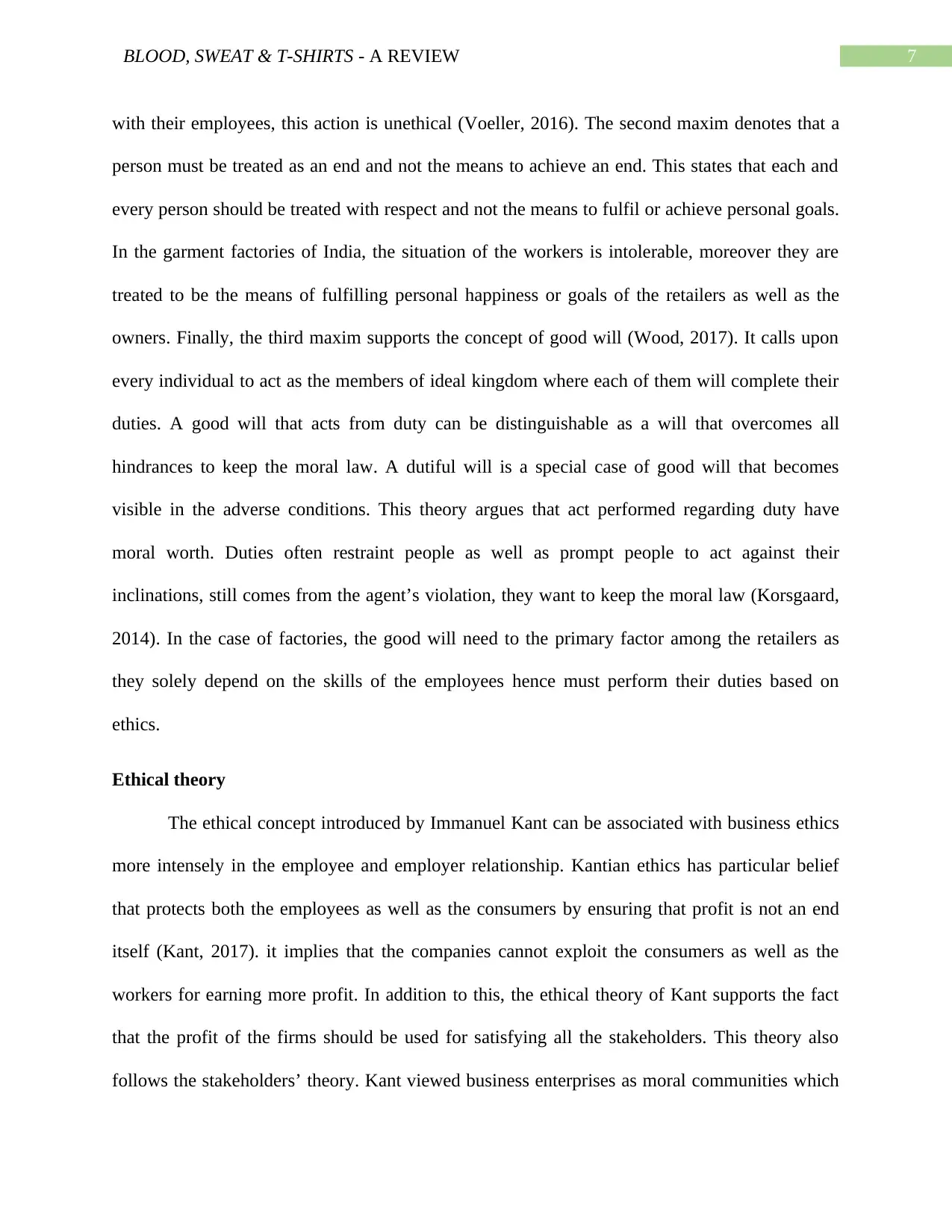
7BLOOD, SWEAT & T-SHIRTS - A REVIEW
with their employees, this action is unethical (Voeller, 2016). The second maxim denotes that a
person must be treated as an end and not the means to achieve an end. This states that each and
every person should be treated with respect and not the means to fulfil or achieve personal goals.
In the garment factories of India, the situation of the workers is intolerable, moreover they are
treated to be the means of fulfilling personal happiness or goals of the retailers as well as the
owners. Finally, the third maxim supports the concept of good will (Wood, 2017). It calls upon
every individual to act as the members of ideal kingdom where each of them will complete their
duties. A good will that acts from duty can be distinguishable as a will that overcomes all
hindrances to keep the moral law. A dutiful will is a special case of good will that becomes
visible in the adverse conditions. This theory argues that act performed regarding duty have
moral worth. Duties often restraint people as well as prompt people to act against their
inclinations, still comes from the agent’s violation, they want to keep the moral law (Korsgaard,
2014). In the case of factories, the good will need to the primary factor among the retailers as
they solely depend on the skills of the employees hence must perform their duties based on
ethics.
Ethical theory
The ethical concept introduced by Immanuel Kant can be associated with business ethics
more intensely in the employee and employer relationship. Kantian ethics has particular belief
that protects both the employees as well as the consumers by ensuring that profit is not an end
itself (Kant, 2017). it implies that the companies cannot exploit the consumers as well as the
workers for earning more profit. In addition to this, the ethical theory of Kant supports the fact
that the profit of the firms should be used for satisfying all the stakeholders. This theory also
follows the stakeholders’ theory. Kant viewed business enterprises as moral communities which
with their employees, this action is unethical (Voeller, 2016). The second maxim denotes that a
person must be treated as an end and not the means to achieve an end. This states that each and
every person should be treated with respect and not the means to fulfil or achieve personal goals.
In the garment factories of India, the situation of the workers is intolerable, moreover they are
treated to be the means of fulfilling personal happiness or goals of the retailers as well as the
owners. Finally, the third maxim supports the concept of good will (Wood, 2017). It calls upon
every individual to act as the members of ideal kingdom where each of them will complete their
duties. A good will that acts from duty can be distinguishable as a will that overcomes all
hindrances to keep the moral law. A dutiful will is a special case of good will that becomes
visible in the adverse conditions. This theory argues that act performed regarding duty have
moral worth. Duties often restraint people as well as prompt people to act against their
inclinations, still comes from the agent’s violation, they want to keep the moral law (Korsgaard,
2014). In the case of factories, the good will need to the primary factor among the retailers as
they solely depend on the skills of the employees hence must perform their duties based on
ethics.
Ethical theory
The ethical concept introduced by Immanuel Kant can be associated with business ethics
more intensely in the employee and employer relationship. Kantian ethics has particular belief
that protects both the employees as well as the consumers by ensuring that profit is not an end
itself (Kant, 2017). it implies that the companies cannot exploit the consumers as well as the
workers for earning more profit. In addition to this, the ethical theory of Kant supports the fact
that the profit of the firms should be used for satisfying all the stakeholders. This theory also
follows the stakeholders’ theory. Kant viewed business enterprises as moral communities which
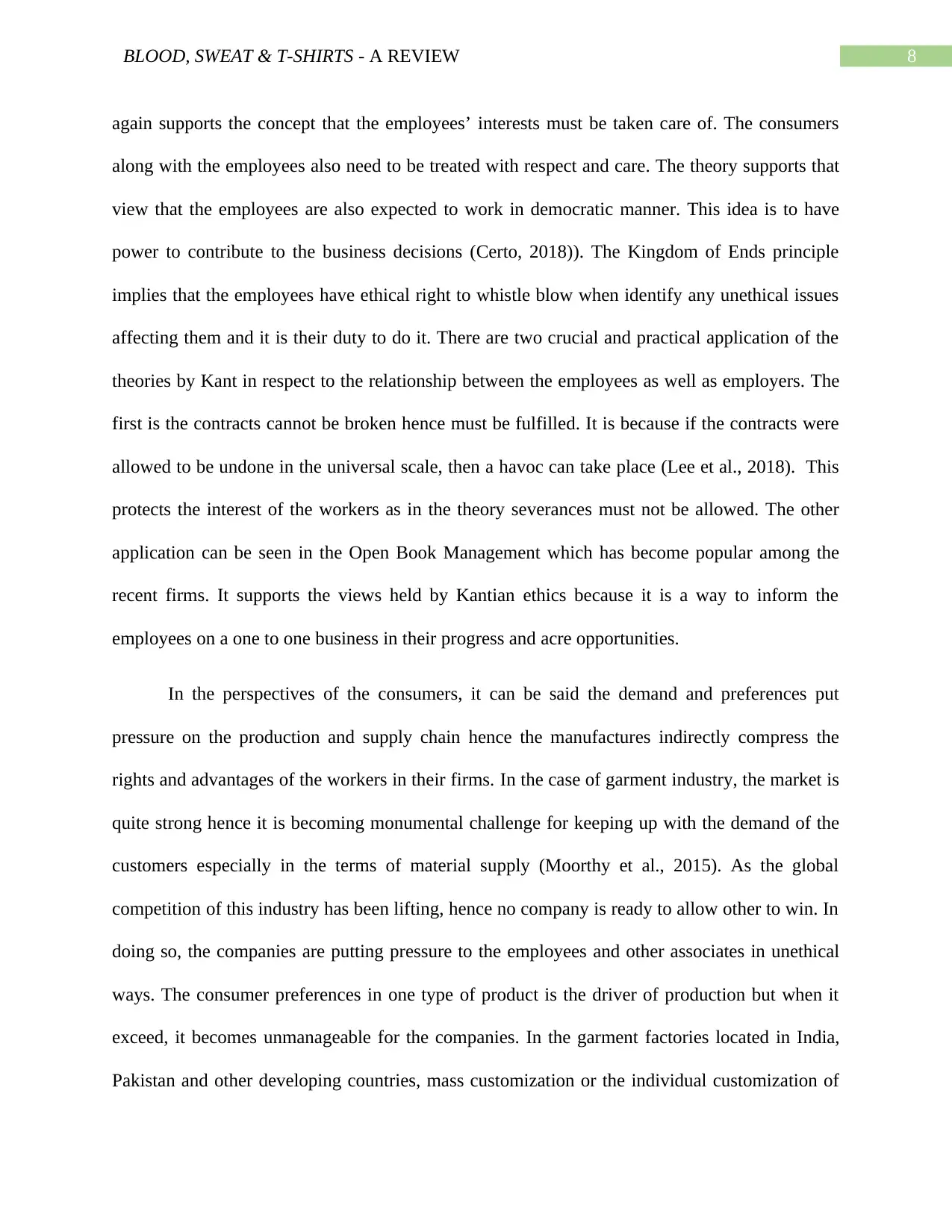
8BLOOD, SWEAT & T-SHIRTS - A REVIEW
again supports the concept that the employees’ interests must be taken care of. The consumers
along with the employees also need to be treated with respect and care. The theory supports that
view that the employees are also expected to work in democratic manner. This idea is to have
power to contribute to the business decisions (Certo, 2018)). The Kingdom of Ends principle
implies that the employees have ethical right to whistle blow when identify any unethical issues
affecting them and it is their duty to do it. There are two crucial and practical application of the
theories by Kant in respect to the relationship between the employees as well as employers. The
first is the contracts cannot be broken hence must be fulfilled. It is because if the contracts were
allowed to be undone in the universal scale, then a havoc can take place (Lee et al., 2018). This
protects the interest of the workers as in the theory severances must not be allowed. The other
application can be seen in the Open Book Management which has become popular among the
recent firms. It supports the views held by Kantian ethics because it is a way to inform the
employees on a one to one business in their progress and acre opportunities.
In the perspectives of the consumers, it can be said the demand and preferences put
pressure on the production and supply chain hence the manufactures indirectly compress the
rights and advantages of the workers in their firms. In the case of garment industry, the market is
quite strong hence it is becoming monumental challenge for keeping up with the demand of the
customers especially in the terms of material supply (Moorthy et al., 2015). As the global
competition of this industry has been lifting, hence no company is ready to allow other to win. In
doing so, the companies are putting pressure to the employees and other associates in unethical
ways. The consumer preferences in one type of product is the driver of production but when it
exceed, it becomes unmanageable for the companies. In the garment factories located in India,
Pakistan and other developing countries, mass customization or the individual customization of
again supports the concept that the employees’ interests must be taken care of. The consumers
along with the employees also need to be treated with respect and care. The theory supports that
view that the employees are also expected to work in democratic manner. This idea is to have
power to contribute to the business decisions (Certo, 2018)). The Kingdom of Ends principle
implies that the employees have ethical right to whistle blow when identify any unethical issues
affecting them and it is their duty to do it. There are two crucial and practical application of the
theories by Kant in respect to the relationship between the employees as well as employers. The
first is the contracts cannot be broken hence must be fulfilled. It is because if the contracts were
allowed to be undone in the universal scale, then a havoc can take place (Lee et al., 2018). This
protects the interest of the workers as in the theory severances must not be allowed. The other
application can be seen in the Open Book Management which has become popular among the
recent firms. It supports the views held by Kantian ethics because it is a way to inform the
employees on a one to one business in their progress and acre opportunities.
In the perspectives of the consumers, it can be said the demand and preferences put
pressure on the production and supply chain hence the manufactures indirectly compress the
rights and advantages of the workers in their firms. In the case of garment industry, the market is
quite strong hence it is becoming monumental challenge for keeping up with the demand of the
customers especially in the terms of material supply (Moorthy et al., 2015). As the global
competition of this industry has been lifting, hence no company is ready to allow other to win. In
doing so, the companies are putting pressure to the employees and other associates in unethical
ways. The consumer preferences in one type of product is the driver of production but when it
exceed, it becomes unmanageable for the companies. In the garment factories located in India,
Pakistan and other developing countries, mass customization or the individual customization of
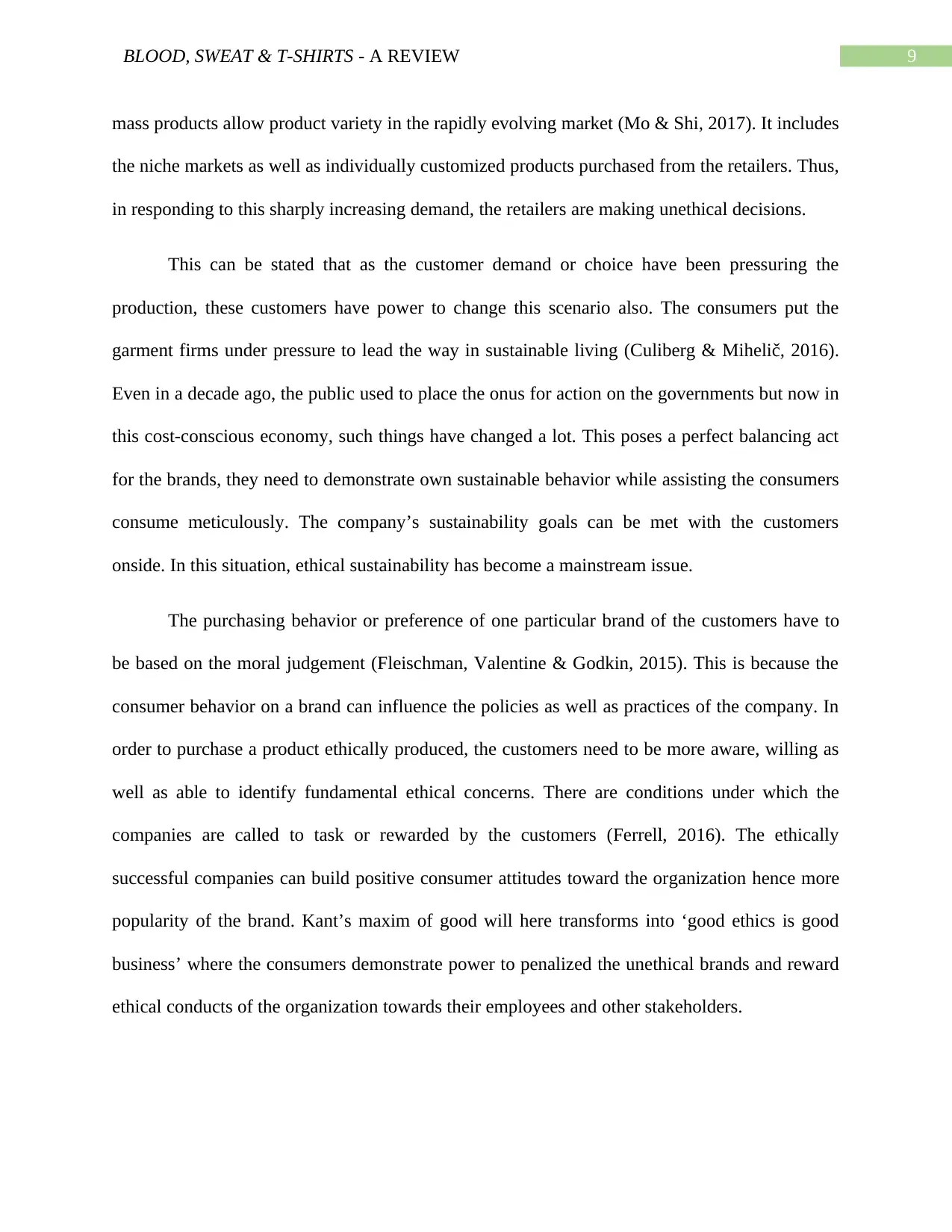
9BLOOD, SWEAT & T-SHIRTS - A REVIEW
mass products allow product variety in the rapidly evolving market (Mo & Shi, 2017). It includes
the niche markets as well as individually customized products purchased from the retailers. Thus,
in responding to this sharply increasing demand, the retailers are making unethical decisions.
This can be stated that as the customer demand or choice have been pressuring the
production, these customers have power to change this scenario also. The consumers put the
garment firms under pressure to lead the way in sustainable living (Culiberg & Mihelič, 2016).
Even in a decade ago, the public used to place the onus for action on the governments but now in
this cost-conscious economy, such things have changed a lot. This poses a perfect balancing act
for the brands, they need to demonstrate own sustainable behavior while assisting the consumers
consume meticulously. The company’s sustainability goals can be met with the customers
onside. In this situation, ethical sustainability has become a mainstream issue.
The purchasing behavior or preference of one particular brand of the customers have to
be based on the moral judgement (Fleischman, Valentine & Godkin, 2015). This is because the
consumer behavior on a brand can influence the policies as well as practices of the company. In
order to purchase a product ethically produced, the customers need to be more aware, willing as
well as able to identify fundamental ethical concerns. There are conditions under which the
companies are called to task or rewarded by the customers (Ferrell, 2016). The ethically
successful companies can build positive consumer attitudes toward the organization hence more
popularity of the brand. Kant’s maxim of good will here transforms into ‘good ethics is good
business’ where the consumers demonstrate power to penalized the unethical brands and reward
ethical conducts of the organization towards their employees and other stakeholders.
mass products allow product variety in the rapidly evolving market (Mo & Shi, 2017). It includes
the niche markets as well as individually customized products purchased from the retailers. Thus,
in responding to this sharply increasing demand, the retailers are making unethical decisions.
This can be stated that as the customer demand or choice have been pressuring the
production, these customers have power to change this scenario also. The consumers put the
garment firms under pressure to lead the way in sustainable living (Culiberg & Mihelič, 2016).
Even in a decade ago, the public used to place the onus for action on the governments but now in
this cost-conscious economy, such things have changed a lot. This poses a perfect balancing act
for the brands, they need to demonstrate own sustainable behavior while assisting the consumers
consume meticulously. The company’s sustainability goals can be met with the customers
onside. In this situation, ethical sustainability has become a mainstream issue.
The purchasing behavior or preference of one particular brand of the customers have to
be based on the moral judgement (Fleischman, Valentine & Godkin, 2015). This is because the
consumer behavior on a brand can influence the policies as well as practices of the company. In
order to purchase a product ethically produced, the customers need to be more aware, willing as
well as able to identify fundamental ethical concerns. There are conditions under which the
companies are called to task or rewarded by the customers (Ferrell, 2016). The ethically
successful companies can build positive consumer attitudes toward the organization hence more
popularity of the brand. Kant’s maxim of good will here transforms into ‘good ethics is good
business’ where the consumers demonstrate power to penalized the unethical brands and reward
ethical conducts of the organization towards their employees and other stakeholders.
Secure Best Marks with AI Grader
Need help grading? Try our AI Grader for instant feedback on your assignments.
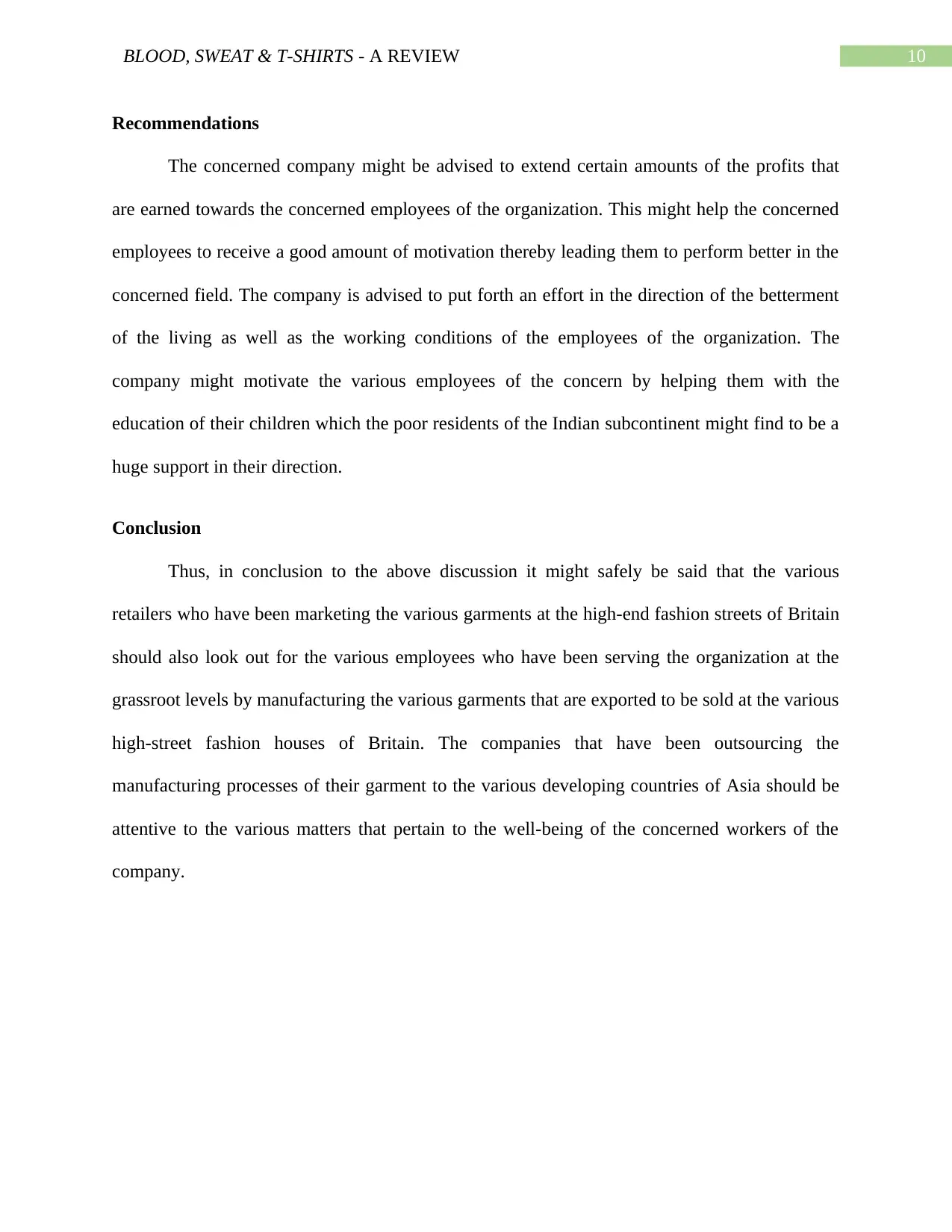
10BLOOD, SWEAT & T-SHIRTS - A REVIEW
Recommendations
The concerned company might be advised to extend certain amounts of the profits that
are earned towards the concerned employees of the organization. This might help the concerned
employees to receive a good amount of motivation thereby leading them to perform better in the
concerned field. The company is advised to put forth an effort in the direction of the betterment
of the living as well as the working conditions of the employees of the organization. The
company might motivate the various employees of the concern by helping them with the
education of their children which the poor residents of the Indian subcontinent might find to be a
huge support in their direction.
Conclusion
Thus, in conclusion to the above discussion it might safely be said that the various
retailers who have been marketing the various garments at the high-end fashion streets of Britain
should also look out for the various employees who have been serving the organization at the
grassroot levels by manufacturing the various garments that are exported to be sold at the various
high-street fashion houses of Britain. The companies that have been outsourcing the
manufacturing processes of their garment to the various developing countries of Asia should be
attentive to the various matters that pertain to the well-being of the concerned workers of the
company.
Recommendations
The concerned company might be advised to extend certain amounts of the profits that
are earned towards the concerned employees of the organization. This might help the concerned
employees to receive a good amount of motivation thereby leading them to perform better in the
concerned field. The company is advised to put forth an effort in the direction of the betterment
of the living as well as the working conditions of the employees of the organization. The
company might motivate the various employees of the concern by helping them with the
education of their children which the poor residents of the Indian subcontinent might find to be a
huge support in their direction.
Conclusion
Thus, in conclusion to the above discussion it might safely be said that the various
retailers who have been marketing the various garments at the high-end fashion streets of Britain
should also look out for the various employees who have been serving the organization at the
grassroot levels by manufacturing the various garments that are exported to be sold at the various
high-street fashion houses of Britain. The companies that have been outsourcing the
manufacturing processes of their garment to the various developing countries of Asia should be
attentive to the various matters that pertain to the well-being of the concerned workers of the
company.
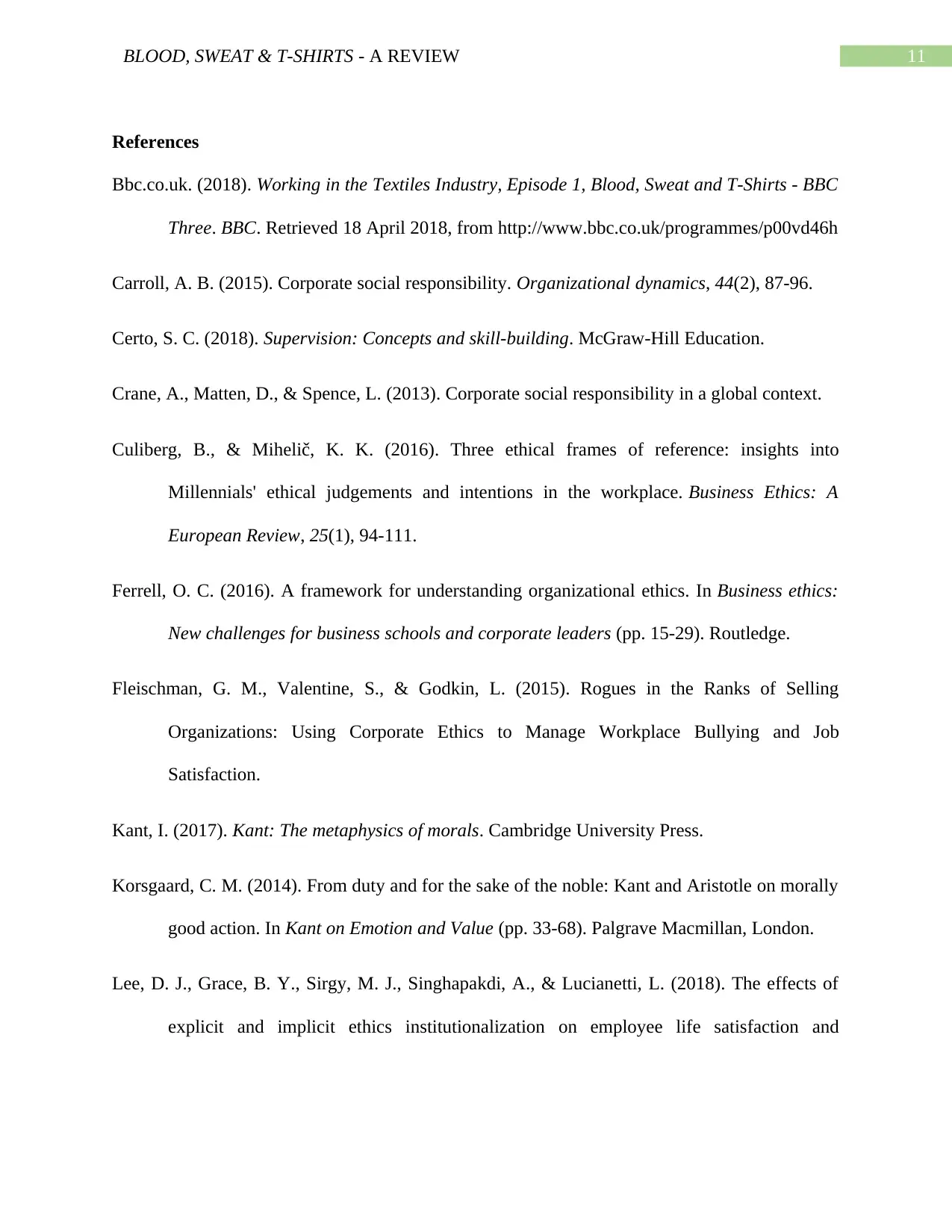
11BLOOD, SWEAT & T-SHIRTS - A REVIEW
References
Bbc.co.uk. (2018). Working in the Textiles Industry, Episode 1, Blood, Sweat and T-Shirts - BBC
Three. BBC. Retrieved 18 April 2018, from http://www.bbc.co.uk/programmes/p00vd46h
Carroll, A. B. (2015). Corporate social responsibility. Organizational dynamics, 44(2), 87-96.
Certo, S. C. (2018). Supervision: Concepts and skill-building. McGraw-Hill Education.
Crane, A., Matten, D., & Spence, L. (2013). Corporate social responsibility in a global context.
Culiberg, B., & Mihelič, K. K. (2016). Three ethical frames of reference: insights into
Millennials' ethical judgements and intentions in the workplace. Business Ethics: A
European Review, 25(1), 94-111.
Ferrell, O. C. (2016). A framework for understanding organizational ethics. In Business ethics:
New challenges for business schools and corporate leaders (pp. 15-29). Routledge.
Fleischman, G. M., Valentine, S., & Godkin, L. (2015). Rogues in the Ranks of Selling
Organizations: Using Corporate Ethics to Manage Workplace Bullying and Job
Satisfaction.
Kant, I. (2017). Kant: The metaphysics of morals. Cambridge University Press.
Korsgaard, C. M. (2014). From duty and for the sake of the noble: Kant and Aristotle on morally
good action. In Kant on Emotion and Value (pp. 33-68). Palgrave Macmillan, London.
Lee, D. J., Grace, B. Y., Sirgy, M. J., Singhapakdi, A., & Lucianetti, L. (2018). The effects of
explicit and implicit ethics institutionalization on employee life satisfaction and
References
Bbc.co.uk. (2018). Working in the Textiles Industry, Episode 1, Blood, Sweat and T-Shirts - BBC
Three. BBC. Retrieved 18 April 2018, from http://www.bbc.co.uk/programmes/p00vd46h
Carroll, A. B. (2015). Corporate social responsibility. Organizational dynamics, 44(2), 87-96.
Certo, S. C. (2018). Supervision: Concepts and skill-building. McGraw-Hill Education.
Crane, A., Matten, D., & Spence, L. (2013). Corporate social responsibility in a global context.
Culiberg, B., & Mihelič, K. K. (2016). Three ethical frames of reference: insights into
Millennials' ethical judgements and intentions in the workplace. Business Ethics: A
European Review, 25(1), 94-111.
Ferrell, O. C. (2016). A framework for understanding organizational ethics. In Business ethics:
New challenges for business schools and corporate leaders (pp. 15-29). Routledge.
Fleischman, G. M., Valentine, S., & Godkin, L. (2015). Rogues in the Ranks of Selling
Organizations: Using Corporate Ethics to Manage Workplace Bullying and Job
Satisfaction.
Kant, I. (2017). Kant: The metaphysics of morals. Cambridge University Press.
Korsgaard, C. M. (2014). From duty and for the sake of the noble: Kant and Aristotle on morally
good action. In Kant on Emotion and Value (pp. 33-68). Palgrave Macmillan, London.
Lee, D. J., Grace, B. Y., Sirgy, M. J., Singhapakdi, A., & Lucianetti, L. (2018). The effects of
explicit and implicit ethics institutionalization on employee life satisfaction and
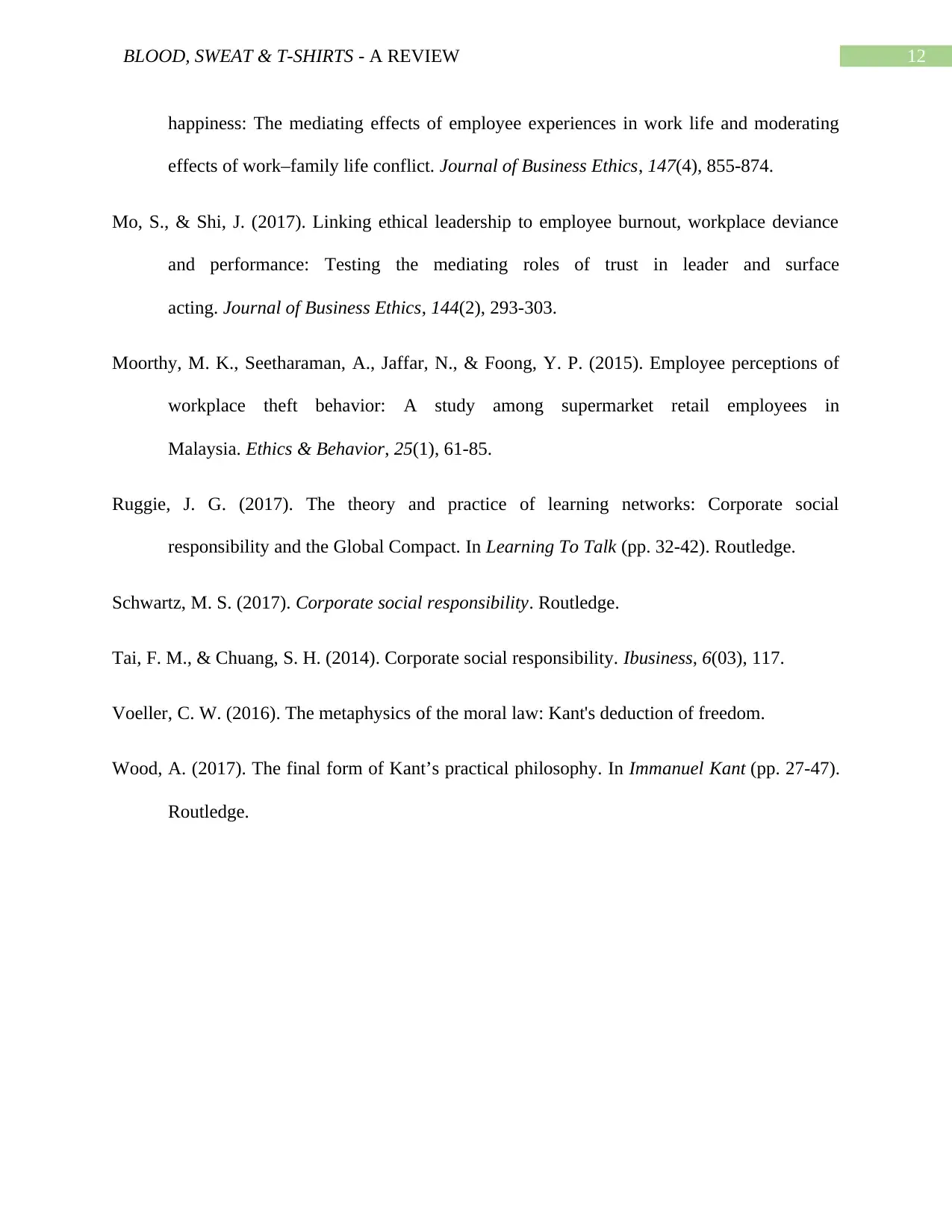
12BLOOD, SWEAT & T-SHIRTS - A REVIEW
happiness: The mediating effects of employee experiences in work life and moderating
effects of work–family life conflict. Journal of Business Ethics, 147(4), 855-874.
Mo, S., & Shi, J. (2017). Linking ethical leadership to employee burnout, workplace deviance
and performance: Testing the mediating roles of trust in leader and surface
acting. Journal of Business Ethics, 144(2), 293-303.
Moorthy, M. K., Seetharaman, A., Jaffar, N., & Foong, Y. P. (2015). Employee perceptions of
workplace theft behavior: A study among supermarket retail employees in
Malaysia. Ethics & Behavior, 25(1), 61-85.
Ruggie, J. G. (2017). The theory and practice of learning networks: Corporate social
responsibility and the Global Compact. In Learning To Talk (pp. 32-42). Routledge.
Schwartz, M. S. (2017). Corporate social responsibility. Routledge.
Tai, F. M., & Chuang, S. H. (2014). Corporate social responsibility. Ibusiness, 6(03), 117.
Voeller, C. W. (2016). The metaphysics of the moral law: Kant's deduction of freedom.
Wood, A. (2017). The final form of Kant’s practical philosophy. In Immanuel Kant (pp. 27-47).
Routledge.
happiness: The mediating effects of employee experiences in work life and moderating
effects of work–family life conflict. Journal of Business Ethics, 147(4), 855-874.
Mo, S., & Shi, J. (2017). Linking ethical leadership to employee burnout, workplace deviance
and performance: Testing the mediating roles of trust in leader and surface
acting. Journal of Business Ethics, 144(2), 293-303.
Moorthy, M. K., Seetharaman, A., Jaffar, N., & Foong, Y. P. (2015). Employee perceptions of
workplace theft behavior: A study among supermarket retail employees in
Malaysia. Ethics & Behavior, 25(1), 61-85.
Ruggie, J. G. (2017). The theory and practice of learning networks: Corporate social
responsibility and the Global Compact. In Learning To Talk (pp. 32-42). Routledge.
Schwartz, M. S. (2017). Corporate social responsibility. Routledge.
Tai, F. M., & Chuang, S. H. (2014). Corporate social responsibility. Ibusiness, 6(03), 117.
Voeller, C. W. (2016). The metaphysics of the moral law: Kant's deduction of freedom.
Wood, A. (2017). The final form of Kant’s practical philosophy. In Immanuel Kant (pp. 27-47).
Routledge.
1 out of 13
Your All-in-One AI-Powered Toolkit for Academic Success.
+13062052269
info@desklib.com
Available 24*7 on WhatsApp / Email
![[object Object]](/_next/static/media/star-bottom.7253800d.svg)
Unlock your academic potential
© 2024 | Zucol Services PVT LTD | All rights reserved.


